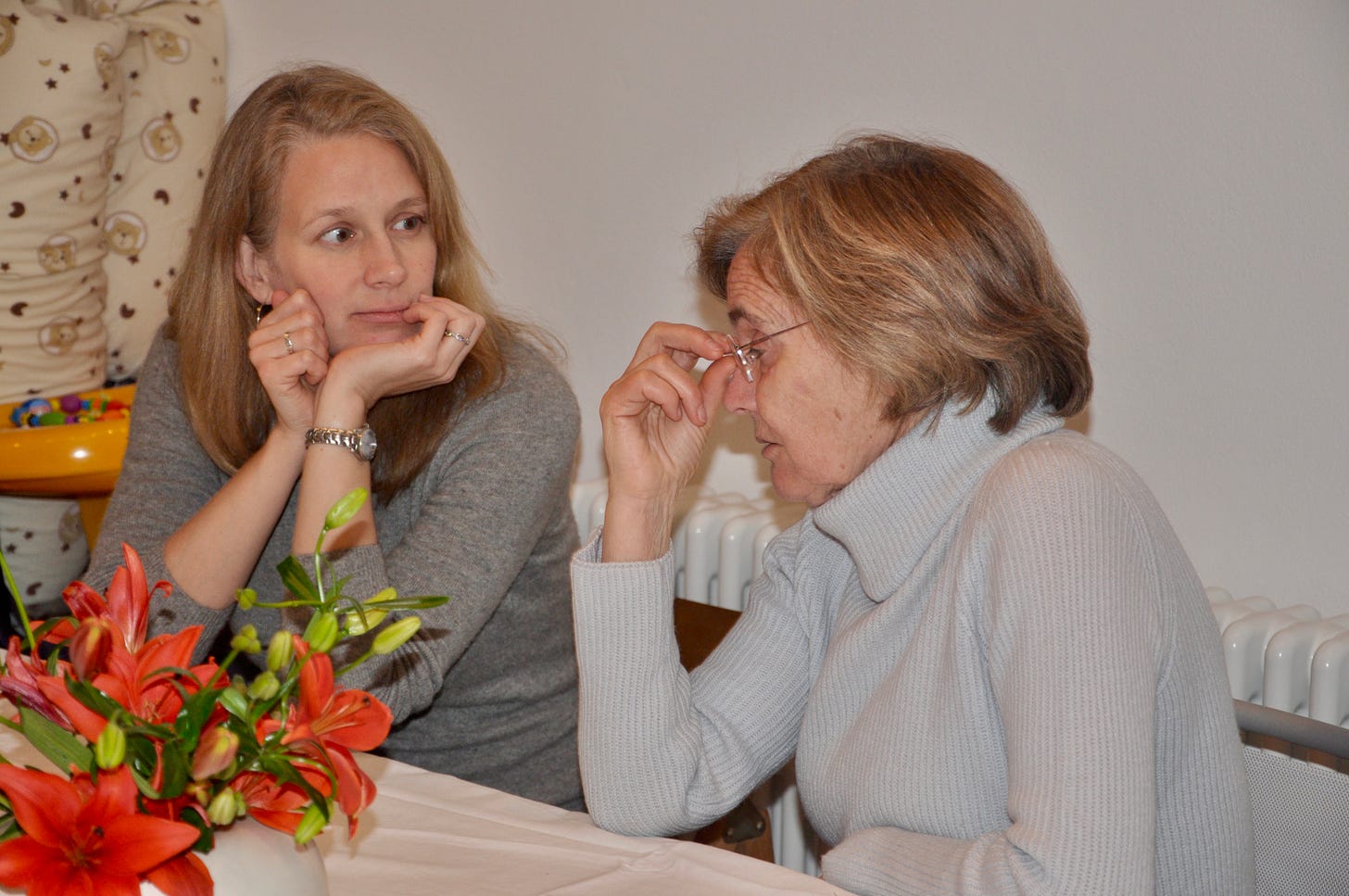Learning Italian: The Slightly Crazy Thing I Did To Speak Better, Faster
and also helped me be more polite and correct in my new culture!
My Italian doctors chuckled at me in my hospital bed, 8 months pregnant, surrounded by Italian grammar books spread over the white hospital sheets. I felt pressured. I had preeclampsia, the baby was coming, and I wasn’t anywhere near fluent in Italian yet.
I’d just moved to Italy a few months prior, acutely naive, and intent on:
only having Italian friends,
integrating fully into the Italian culture, and
speaking properly and POLITELY…
ALL before the baby was born.
Noble goals. Unrealistically unattainable. But let’s be kind and blame the pregnancy hormones.
With a manic desire to expedite my fluency, I proposed the following idea to my non-English-speaking Italian mother-in-law (MIL) and she accepted… so we went on this way for 7 years:
My MIL would not change the way she spoke to me and would address me using the INFORMAL “you”.
I, however, would address HER in the FORMAL “you” for practice.
It’s not just grammar
For those of you who understand the cultural significance of this, you’re probably like ‘oh sh*t, she did what?!’
It was brilliant practice and I really pride myself on being able to converse confidently in formal Italian situations, however, I unwittingly put me and my MIL, who was at that time my closest friend and family member, on unequal footing. Was it worth it? I think so. Let me explain.
2 ways to say YOU in Italian
Like Spanish and French, Italian has 2 ways to say “you” when you speak to someone directly: the formal and the informal.
Which “YOU” you choose is based on the respect you want to give.
TU: the informal "you” is used for friends and people younger than you
LEI: the formal “you” is used with people you don’t know, people older than you, and professional people like doctors, judges, the list is long…
So you can see, if you leave your house or even just make phone calls, many people should be spoken to using the formal “you” in daily Italian life. It’s an important piece of culture and societal interaction.
However, when I first moved to Italy, since most longer conversations were with using the informal “TU”, I didn’t get much practice with the “LEI” and would freeze up or completely massacre the conversation.
I wanted to be able to seamlessly slip into formal “Lei” conversation without having to pause to think about verb conjugation, sentence structure, and matching pronouns and adjectives.
I’m curious what other romance language speakers and particularly Italians think about this. At the beginning, I just looked at this as grammar practice, but as the years passed, I began to realize, since my MIL of course always “gave me the tu”, it put us always on grammatically unequal footing. I was always her subordinate, while I was always giving her grammatical respect.
Did you know Italian Grammar is like doing Algebra in your Head?
Before it became automatic, I often compared conversations in Italian to doing math in your head without any scrap paper.
This is yet another reason I wanted to practice with my mother in law, who was one of the people I saw most when I first moved to Italy since I had no friends or family and lived at the edge of a tiny village.
All the verbs and prepositions change and are different depending on which YOU you choose. Greetings change too. You do not use a casual ‘ciao’ in a formal conversation. For example: “Hello, have a seat” would be:
Informal TU: Ciao, (tu) accomodati
Formal LEI: Buongiorno, (Lei) si accomodi
Adoro speaking Italian and the Italian language, but the whole formal tense is initially a collosal brain-twister for a mother tongue American-English speaker, a language with little ceremony.
Couldn’t you just use the informal TU with everyone?
Yes, you can. All Italians will understand you. I know many immigrants and expats here in Italy who ONLY use the informal ‘TU’ in ALL circumstances with ALL people. Honestly, I think this is great. They have made the effort to learn and communicate in Italian.
When I arrived in Italy 15 years ago, I understood from my Italian teachers and family, that this was inappropriate and tolerated at best, rude at worst. I wanted to automatically be able to speak politely and correctly in all situations, without having to do crazy calculations of what the correct grammar should be.
Looking back now, it almost seems like foreshadowing of my five year divorce in the Italian court system where I certainly needed my formal Italian. I wonder if I’d payed more attention to non-verbal cues and cultural differences - and less attention to grammar, I wouldn’t have ended up where I did. The language is a representation of the culture, not simply a communication tool.
Click the comment button to share your thoughts!
Is this a strategy you’d consider to learn a romance language?
If you are Italian, do you think I made a cultural mistake or was the imbalance inevitable between a foreign daughter-in-law and Italian mother-in-law?
If you’re learning Italian and want a deeper dive into TU and LEI, I really like this video from My Italian Circle; it even has exercises if you want some practice!










I learned Italian to fluency in college, partially by living and speaking only Italian for 18 months. I had only taken 2 years of “liberal arts college” Italian before I went.
I remember learning all those verb tenses in class, and then being shocked that nobody actually uses most of them in speech. I spent so much time trying to purposefully execute each verb tense in my speech. The path to fluency, though, came with letting go of written conventions and using the language that was most accessible to my tongue. The complex verb tenses came naturally to my speech in about 6months. They came into my spoken language more through reading and writing than gaining facility through speech.
(Or, hilariously, certain regions of Italy would be obsessed with very specific aspects of grammar. Italian speakers in certain regions of Italy (Florence especially) will use the supposed unspoken historical past in common language, to speak about their childhood. It’s actually hilarious when you think about it. It’s very cheeky. Florentines are fun with language.)
Florentines also love a Lei. Almost comically. It’s endearing. What really helped me bridge the gap between perceived impoliteness and speaking fluency is using the Lei strategically. I always used it very showily during the first time I address an elder to demonstrate I know Italian and its grammar conventions. Then I switched to “tu” in every subsequent time. People know I’m not a native Italian speaker, and the ability to even speak Italian as a foreigner conveys a TON of respect, especially to professionals who probably know English. Because I look very Italian, I sometimes joke witg people, in Italian, that I’m a stupid American and can they please help me. This is an obvious joke, and it really helps break the tension of my obvious non-native speaking and my native appearance.
So much of my journey to fluency was giving up the verbal precision that I was used to in English. Verbal fluency is about ease of producing the language, not producing the perfect phrasing l.
I’m almost 40, and use my Italian rarely, but I’m still quasi fluent because I can just go up to someone and easily describe what I need, even if I don’t have the words. Part of this derives from learning to use what language I had, instead of attempting to conjure the perfect words.
I was at the doctors office Saturday and I used Lei with the receptionist who was younger than me. I thought since this was a formal situation it would be polite. The people after me used TU! I guess it’s better to start with Lei, my acupuncturist said “let’s use tu” with each other and I thought that was nice 😊